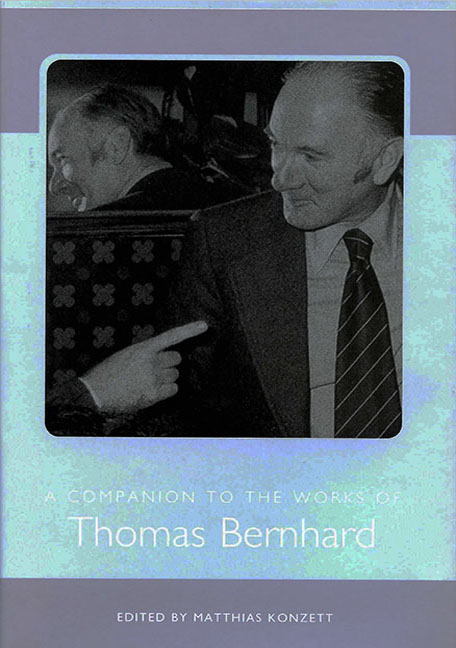Book contents
- Frontmatter
- Contents
- Acknowledgments
- Abbreviations
- Bernhard in the Public
- Introduction National Iconoclasm: Thomas Bernhard and the Austrian Avant-garde
- Perverted Attitudes of Mourning in the Wake of Thomas Bernhard's Death
- The Established Outsider: Thomas Bernhard
- A Testament Betrayed: Bernhard and His Legacy
- Bernhard's Poetics
- Bernhard and Drama
- Bernhard's Social Worlds
- Works Cited
- Notes on the Contributors
- Index
Introduction National Iconoclasm: Thomas Bernhard and the Austrian Avant-garde
from Bernhard in the Public
Published online by Cambridge University Press: 28 April 2017
- Frontmatter
- Contents
- Acknowledgments
- Abbreviations
- Bernhard in the Public
- Introduction National Iconoclasm: Thomas Bernhard and the Austrian Avant-garde
- Perverted Attitudes of Mourning in the Wake of Thomas Bernhard's Death
- The Established Outsider: Thomas Bernhard
- A Testament Betrayed: Bernhard and His Legacy
- Bernhard's Poetics
- Bernhard and Drama
- Bernhard's Social Worlds
- Works Cited
- Notes on the Contributors
- Index
Summary
This collection of essays on Thomas Bernhard takes a fresh look at the author following the recent tenth anniversary of his death. Although Bernhard may have left in the eyes of some readers a rather embittered final will, prohibiting his plays to be performed in Austria for years to come, the positive reception of his works has steadily grown internationally. Bernhard's final act of self-annihilation, histrionic and ambivalent as it may be, did little to decrease or increase his already significant status as one of the most important German speaking postwar authors. Like Kafka or Becket, Bernhard has become a thoroughly canonical figure in modern literature with a bold new style that defies imitation. In Kierkegaard's sense, he may even be called a classic author, one who meets up with the defining moments of history, creating a unique and unrepeatable expression of an era. As a writer inheriting the dubious legacy of Austria's fascist past and its complicity with genocidal crimes, Bernhard has examined the violence that constitutes fascism more thoroughly and more relentlessly than most of his Austrian contemporaries. His unique style captures the xenophobic and claustrophobic atmosphere of Austria's postwar cultural homogeneity, marking the descent from an imperial transnational cultural order into the terror of a petty-bourgeois national one. Naturally, Bernhard overstates his case, idealizing at once the imperial past while denying the significant political changes that have marked Austria's democratic postwar culture. However, Bernhard's critical prose and drama serve as a steady reminder of the unease that surrounds the country's desired return to a state of normality.
The criticism of Bernhard, which this volume assembles, has also grown with the author and reached a more acute stance of self-criticism. Bernhard is no longer uncritically worshipped, as was the case when he entered the literary scene in the 1960s and 1970s. Critics have become increasingly wary of Bernhard's seductive iconoclasm, suspecting beneath it remaining symptoms of the disease the author purports to cure. Ria Endres's pathbreaking feminist study on Bernhard, Am Ende angekommen published in 1980, no longer comes as a shock to today's readers as it did to the many Bernhard devotees of that time. Instead, we have grown quite used to reading Bernhard against the grain while acknowledging the continuing benefit that is derived from reading his works.
- Type
- Chapter
- Information
- A Companion to the Works of Thomas Bernhard , pp. 1 - 22Publisher: Boydell & BrewerPrint publication year: 2002

